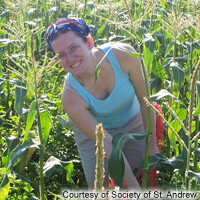Society of St. Andrew

Project Information
Salvaging fresh produce to reduce hunger and improve health of people in greatest need across the US
Describe the need affecting community
How will this Advance project help to address the need?
The Society of St. Andrew engages 30,000 or more volunteers (both people with plenty and those in need) each year in the biblical practice of gleaning: picking, digging, or gathering nutritious food remaining after harvest to share with neighbors in need. This Gleaning Network joins the Society of St. Andrew’s robust produce salvage program (the Potato & Produce Project), that transports large truckloads of surplus or unmarketable produce to areas of greatest need. The Seed Potato Project delivers seed potatoes to high-poverty Appalachian communities, so residents can grow food to feed their families and share with their neighbors. Through Harvest of Hope, the Society of St. Andrew’s work/study mission retreat program, hundreds of young people and adults each year learn about hunger and creation care through Bible study, dynamic worship, and educational programming. Their study time supports days of field gleaning, and leads to projects addressing hunger in their own communities upon their return home. These programs together (Gleaning Network, Potato & Produce Project, Seed Potato Project, and Harvest of Hope) share 25-40 million pounds (75-120 million servings) of healthy food with people in greatest need throughout the United States.
Describe the primary goal of the project
The Society of St. Andrew will mobilize and engage volunteers to conserve and steward earth’s resources, salvaging and sharing fresh produce, so that everyone in the United States has access to healthy food and sufficient food to thrive.
Describe the change you would like to see in the community as a result of this Advance project
The Society of St. Andrew envisions a world without hunger. When sharing healthy and nourishing food with people in need becomes standard practice, and when discarding healthy food or tossing it in landfills becomes a last resort rather than an easy choice, then we will see our communities changing in ways that respect human life and earth’s resources.

